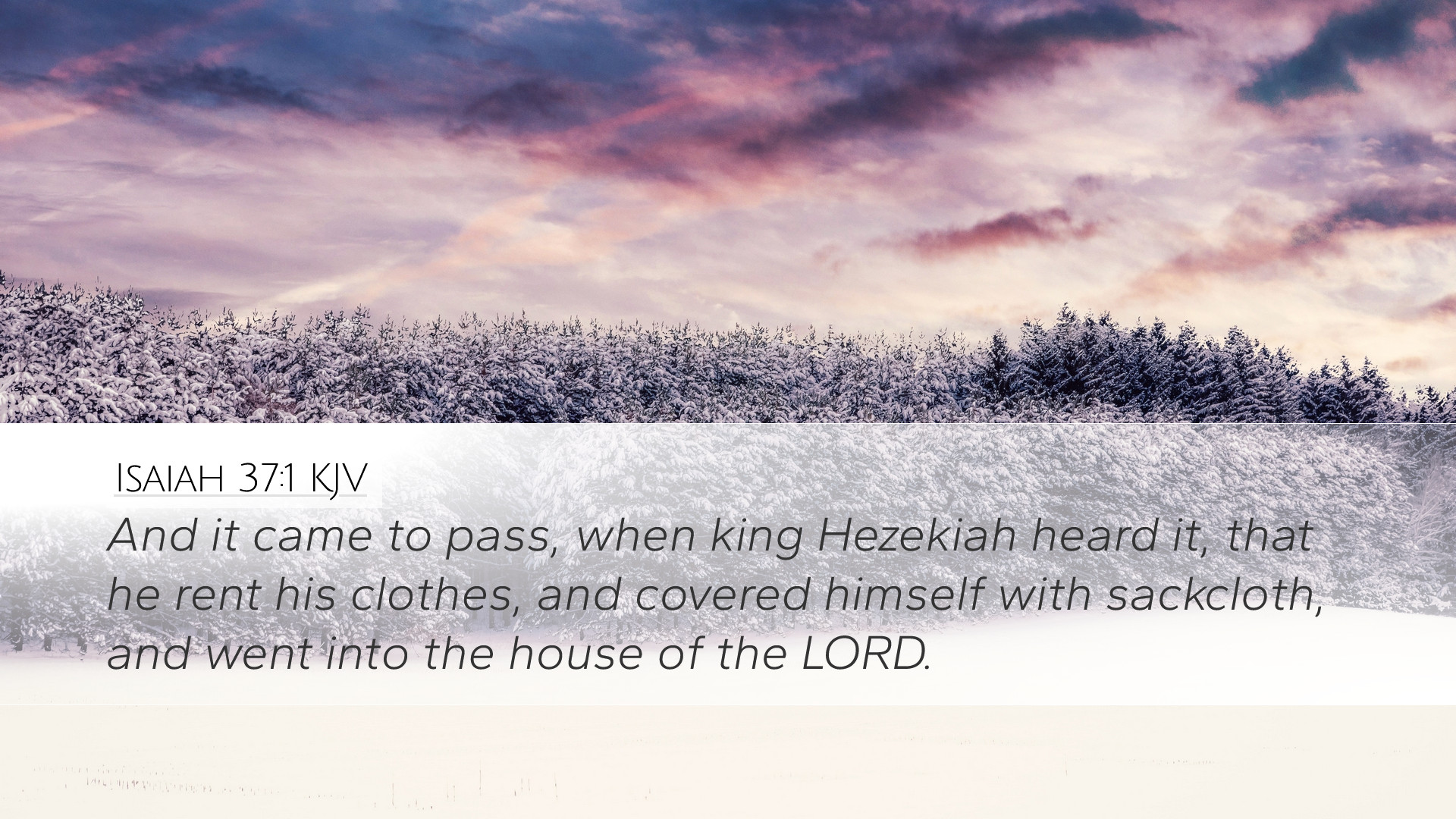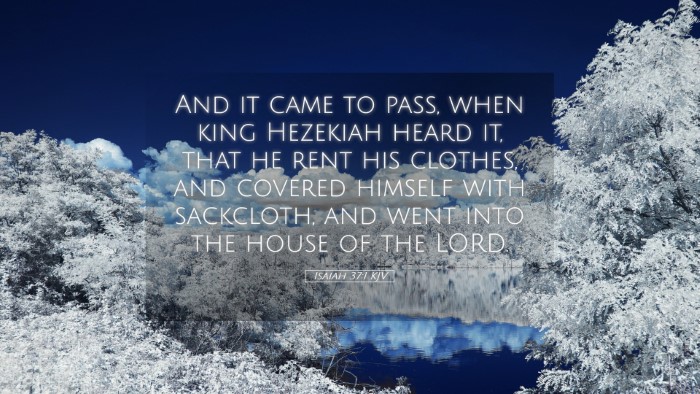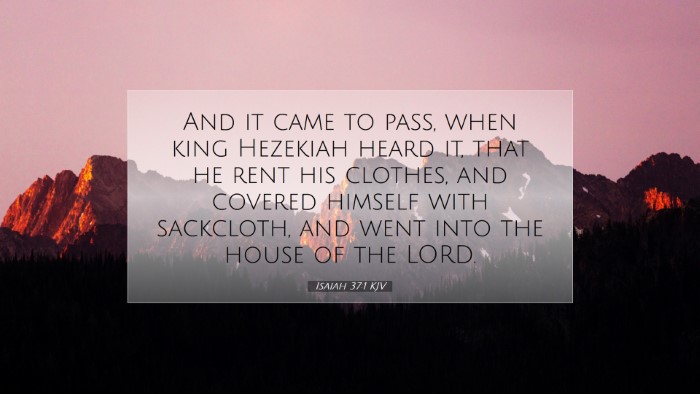Isaiah 37:1 - Commentary and Insights
The verse Isaiah 37:1 falls within a critical juncture in the biblical narrative, particularly within the historical context of the Assyrian threat to Judah during the reign of King Hezekiah. This commentary synthesizes insights from renowned public domain commentaries, focusing on the significance and implications of this passage for contemporary readers, including pastors, students, theologians, and scholars.
Text of Isaiah 37:1
"And it came to pass, when King Hezekiah heard it, that he rent his clothes, and covered himself with sackcloth, and went into the house of the Lord."
Contextual Background
The backdrop of Isaiah 37 centers on the Assyrian siege of Jerusalem, a pivotal moment that illustrates both divine Providence and human response to crisis. King Hezekiah, facing the overwhelming might of Sennacherib's army, serves as a model of faithfulness amidst despair. His actions upon hearing the threats from the Assyrians reveal a profound spiritual and emotional response that is essential for understanding the verse.
Historical Context
Matthew Henry emphasizes that this period signifies a time of great peril for Judah, culminating in the imminent invasion by the Assyrians. The narrative unfolds as Sennacherib sends messengers to intimidate and demoralize the inhabitants of Jerusalem. The political landscape was characterized by fear and uncertainty, underscoring the need for divine intervention.
In this historical frame, Albert Barnes notes that Hezekiah's response is emblematic of covenant fidelity; the king seeks to return to God during a national crisis. His actions reflect a deep recognition of the gravity of the situation and the necessity of invoking God's help as a leader of his people.
Hezekiah's Response
The phrase "when King Hezekiah heard it" indicates an immediate awareness and response to impending calamity. The actions that follow—the tearing of garments, donning of sackcloth, and entering the house of the Lord—serve as a multi-faceted approach to mourning and seeking divine assistance.
Rending of Clothes
Adam Clarke describes the act of rending one's garments as a traditional expression of grief, signaling a deep emotional turmoil. This act serves not only as a personal lament but as a public declaration of distress and a desire for repentance. Hezekiah's action showcases humility and a recognition of Israel’s dependence on God's mercy.
Sackcloth as a Symbol of Mourning
Hezekiah's clothing of sackcloth further emphasizes sincere contrition. According to Matthew Henry, sackcloth symbolizes mourning and repentance throughout biblical texts. It indicates not merely a surface-level acknowledgment of the dire circumstances but a genuine plea for help and averting judgment.
Entering the House of the Lord
This act of entering the house of the Lord signifies a return to worship and supplication. Albert Barnes explains that Hezekiah recognized where true power lies—in communion with God. In troubling times, it is essential to turn to places of spiritual refuge, seeking guidance and intervention from the Almighty.
Theological Implications
Hezekiah's actions prompt reflections on faith, leadership, and the dynamics of human response to crises. The intersection of divine sovereignty and human agency is a recurring theme in Isaiah, providing rich material for theological discourse and application.
Faith Amidst Fear
Matthew Henry suggests that Hezekiah's response offers a model for confronting fear with faith. In times of trouble, God's people are called to turn to Him, recognizing His power over earthly rulers and armies. The tension between fear and faith becomes a fertile ground for spiritual growth and dependence on God.
Public Leadership and Accountability
Hezekiah's role as a leader involves not only personal faith but also guiding his people back to God. Albert Barnes articulates that there is a corporate dimension to repentance and seeking God’s mercy. The actions of leaders can inspire communal faith, positioning them as examples for congregations and nations in turmoil.
The House of the Lord: A Place of Refuge
The significance of the temple in this passage reverberates throughout scripture. Adam Clarke notes that the temple not only served as a physical location for worship but also as a symbol of God’s covenant presence. It teaches that in times of distress, believers ought to draw nearer to God, finding solace and strength in worship and prayer.
Contemporary Application
The insights from Isaiah 37:1 continue to resonate with modern readers, addressing both personal and communal dynamics in the face of adversity. Pastors, theologians, and students of the Bible are encouraged to reflect on the implications of Hezekiah's actions in their own contexts.
Encouragement for Personal Spirituality
Matthew Henry advocates for individual believers to adopt Hezekiah's posture of humility and reliance on God when faced with trials. Personal devotion becomes an anchor during turbulent times, emphasizing that a return to God is the pathway to renewal and hope.
Collective Responsibility in Crisis
The communal aspect of Hezekiah’s response in prayer and mourning invites a conversation about the church’s role during crises. Albert Barnes points out that congregations are called to unite in prayer, seeking divine intervention collectively, thereby reflecting a robust accountability among the body of believers.
Worship as a Response to Adversity
Worship, as demonstrated by Hezekiah, fosters a deeper connection with God amidst troubling circumstances. Adam Clarke asserts that in worship, believers meet the living God, and it serves as both a refuge and a source of empowerment to face challenges. Pastors and students are encouraged to facilitate worship that responds to the realities of life, connecting the spiritual endeavor with existential crises.
Conclusion
Isaiah 37:1 encapsulates a profound moment in biblical history, illustrating the tension between human vulnerability and divine sovereignty. Drawing from the insights of respected commentators, we find a narrative rich with implications for faith, leadership, and community in crisis. Hezekiah's example of earnestness in seeking God continues to inspire believers today to approach their challenges with humility, unity, and trust in the Lord’s providential care.


